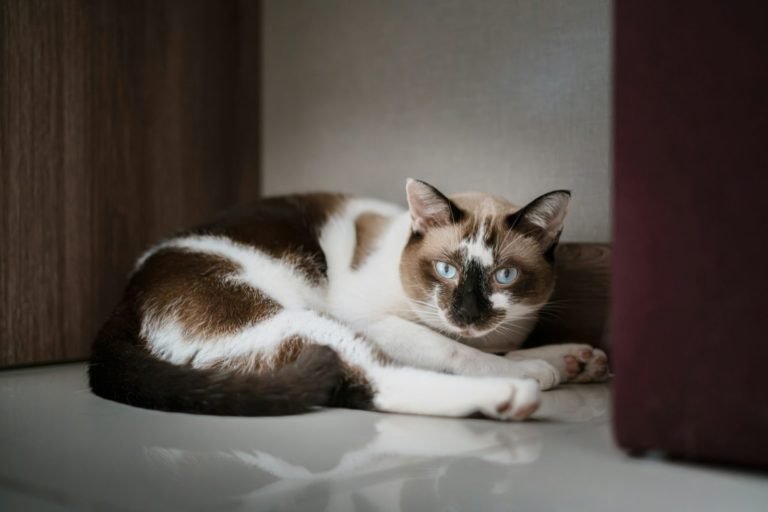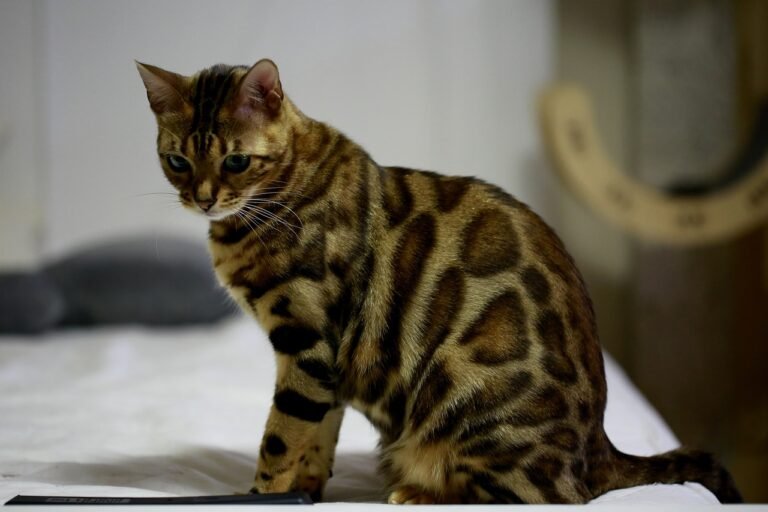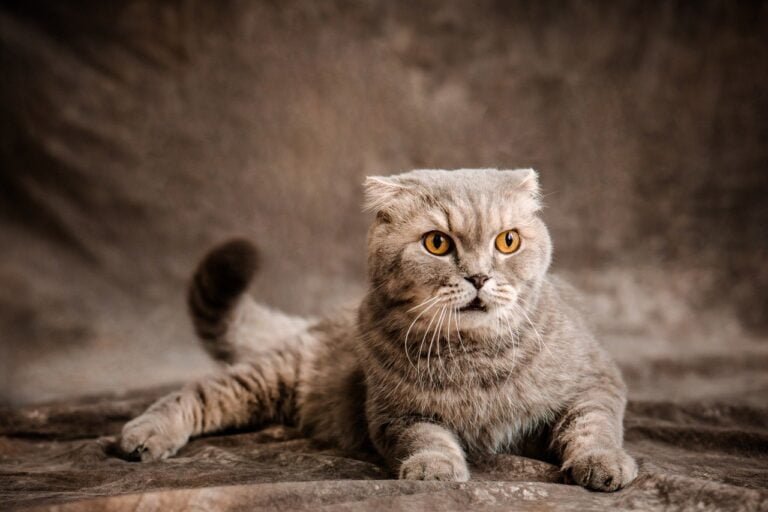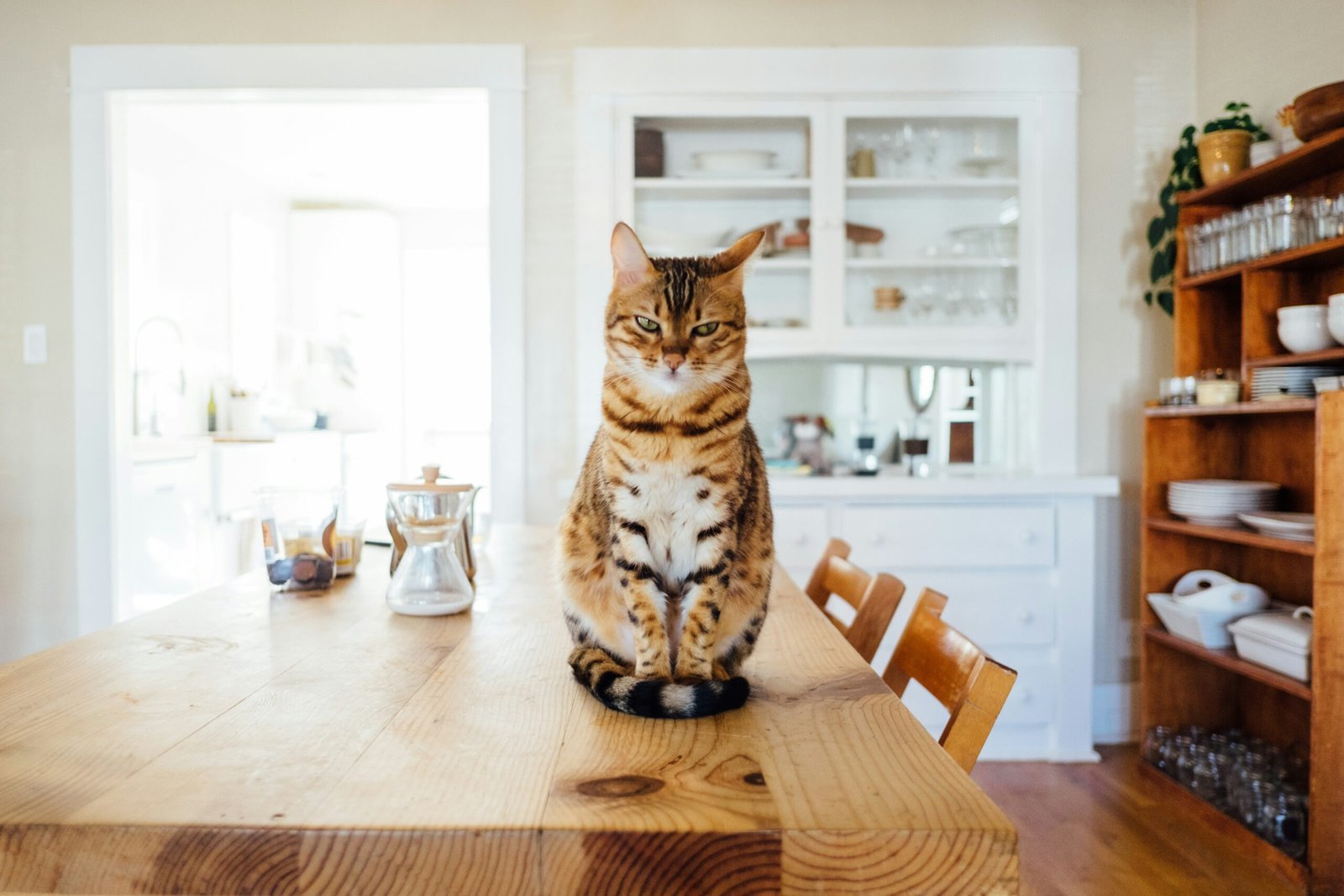
Are you a cat lover who’s drawn to the elegant simplicity of a sleek coat? Or are you seeking a feline companion that requires less grooming maintenance? Look no further than the wonderful world of short haired cat breeds!
These charming creatures offer all the love and companionship of their fluffier counterparts but with a stylish, low-shedding twist.
Short haired cat breeds have captivated human hearts for centuries, from the regal Siamese that graced ancient temples to the spunky American Shorthair that’s become a modern household favorite. These cats aren’t just about looks – they’re a diverse group with a wide range of personalities, sizes, and unique characteristics that make them suitable for various lifestyles and preferences.
In this comprehensive guide, we’ll explore the fascinating realm of short haired cat breeds, unveiling the distinct traits that make each one special. Whether you’re allergy-conscious, time-strapped, or adore the sleek aesthetic, there’s bound to be a short haired feline that captures your heart.
But it’s not all about appearance – we’ll delve into the unique personalities, health considerations, and care requirements of these breeds. Whether you’re a first-time cat owner or a seasoned feline enthusiast looking to expand your furry family, this guide will provide valuable insights to help you find your perfect short haired match.
So, are you ready to embark on a journey through the captivating world of short haired cat breeds?
Prepare to be charmed by these sleek and sweet feline friends as we uncover the qualities that make them such beloved companions. Let’s dive in and explore the wonderful variety of short haired cats waiting to win your heart!
What Makes a Cat Belong to the “Short Haired Cat Breeds”?
Before we start looking at specific short haired cat breeds, let’s talk about what “short haired” actually means for cats. While there’s no official rule, most cat experts consider a cat to be short haired if its fur is less than 2 inches (5 cm) long.
Short haired cat breeds usually have two layers of fur:
- The topcoat – the outer layer of visible fur
- The undercoat – a softer, fluffier layer close to the skin
This shorter coat is often easier to care for than long hair, but short haired cat breeds still need some grooming to keep their fur healthy and reduce shedding.
10 Popular Short Haired Cat Breeds
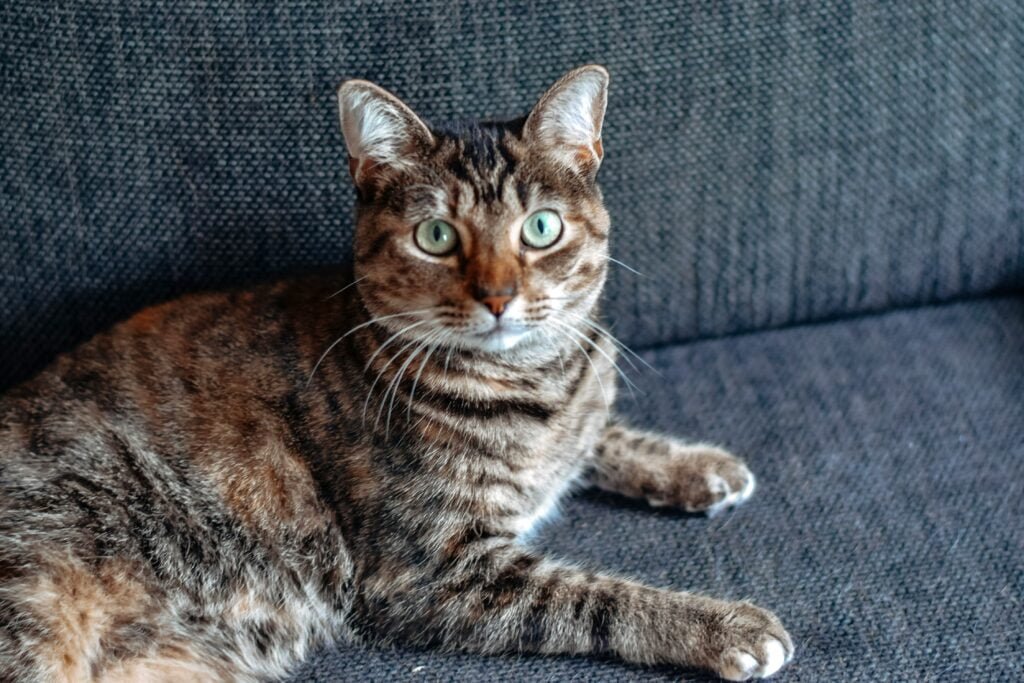
Now let’s look at some of the most popular and well-known short haired cat breeds. Remember, there are many wonderful short haired kitties out there, so this is just a sample of some fan favorites!
1. American Shorthair
American Shorthairs are one of the most popular cat breeds in the United States. They have medium-sized, muscular bodies and round faces with short, dense fur.
- Personality: American Shorthairs are usually friendly, easygoing cats. They’re playful but not too energetic, making them great family pets. They tend to get along well with children and other pets.
- Grooming needs: Low. Weekly brushing is usually enough to keep the cat’s coat healthy and reduce shedding.
- Fun fact: American Shorthairs are descended from cats that came to North America on ships with early European settlers!
2. Siamese
Siamese cats are known for their striking blue eyes and color point coats (darker colors on the face, ears, paws, and tail). They have sleek, elegant bodies with short, fine fur.
- Personality: Siamese cats are usually very vocal, intelligent, and people-oriented. They love to “talk” to their humans and often form strong bonds with their owners.
- Grooming needs: Very low. The cat’s short, fine fur is easy to care for with occasional brushing.
- Fun fact: In Thailand (formerly Siam), Siamese cats were considered sacred and lived in temples.
3. Russian Blue
Russian Blues have a distinctive silvery-blue coat with a plush, velvety texture. They have green eyes and a gentle, smiling expression.
- Personality: Russian Blues are usually quiet, gentle, and a bit shy with strangers. They tend to be very loyal to their families and enjoy a calm home environment.
- Grooming needs: Low. The cat’s dense, short coat doesn’t shed much and is easy to maintain with weekly brushing.
- Fun fact: Russian Blues are sometimes called “Archangel Blues” because some people believe they came from the Archangel Isles in northern Russia.
4. Abyssinian
Abyssinians have a unique ticked coat, where each hair has bands of color. These bands give the cats a wild, cougar-like appearance. They have large ears and almond-shaped eyes.
- Personality: Abyssinians are usually very active, playful, and curious cats. They love to explore and can be quite acrobatic. Abyssinians often enjoy playing with puzzle toys and learning tricks.
- Grooming needs: Low. The cat’s short coat is easy to care for with occasional brushing.
- Fun fact: Abyssinians are one of the oldest known cat breeds. They look a lot like the cats in ancient Egyptian artwork!
5. British Shorthair
British Shorthairs are sturdy, round-faced cats with dense, plush coats. They’re often blue (gray) in color but can come in many other colors and patterns, too.
- Personality: British Shorthairs are usually calm, easygoing cats. They’re affectionate but not overly demanding. They tend to be good with children and other pets.
- Grooming needs: Low to medium. The cat’s thick coat benefits from regular brushing to remove loose fur and reduce shedding.
- Fun fact: The Cheshire Cat in Alice in Wonderland was probably based on a British Shorthair!
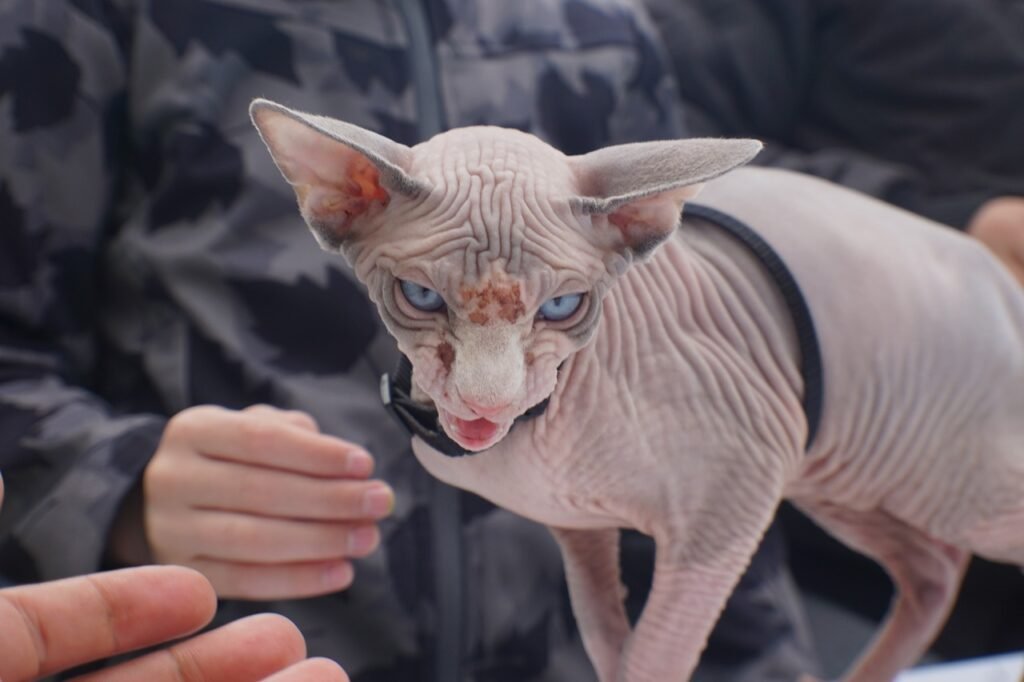
6. Sphynx
Sphynx cats are famous for being “hairless,” although they actually have a very fine, downy fuzz covering their skin. They have wrinkled skin and large ears, giving them a unique appearance.
- Personality: Sphynx cats are usually very friendly, energetic, and attention-seeking. They love to be with their people and are often described as “dog-like” in their behavior.
- Grooming needs: Special. Although they don’t have fur to brush, Sphynx cats need regular baths to remove oils from their skin.
- Fun fact: Despite their lack of fur, Sphynx cats are actually warm to the touch because of their higher body temperature!
7. Scottish Fold
Scottish Folds are known for their distinctive folded ears, which give them an owl-like appearance. They have round faces and medium-length bodies with short, dense fur.
- Personality: Scottish Folds are usually sweet-tempered, adaptable cats. They tend to be good with children and other pets and enjoy being around their humans.
- Grooming needs: Low to medium. Regular brushing helps keep the cat’s coat healthy and reduces shedding.
- Fun fact: Not all Scottish Fold kittens are born with folded ears. Some have straight ears like other cats!
8. Bengal
Bengals have a wild appearance with spotted or marbled coats that resemble leopards. They have muscular bodies and short, soft fur.
- Personality: Bengals are usually very active, intelligent, and curious cats. They love to play and explore, and many enjoy playing in water.
- Grooming needs: Low. The cat’s short, soft coat is easy to maintain with occasional brushing.
- Fun fact: Bengals were created by breeding domestic cats with Asian Leopard Cats to get their wild-looking coat patterns.
9. Burmese
Burmese cats have sleek, muscular bodies with short, silky fur. They often have golden eyes and come in several colors, including sable, champagne, BlueBlue, and platinum.
- Personality: Burmese are usually very affectionate, playful, and people-oriented cats. They often enjoy being lap cats and following their humans around the house.
- Grooming needs: Very low. The cat’s short, fine coat is easy to care for with occasional brushing.
- Fun fact: Burmese cats are sometimes called “brick wrapped in silk” because of their surprisingly heavy, muscular bodies.
10. Devon Rex
Devon Rex cats have a unique appearance with large ears, big eyes, and a wavy, very short coat that feels like suede.
- Personality: Devon Rex cats are usually very playful, active, and affectionate. They’re known for being mischievous and love to be involved in whatever their humans are doing.
- Grooming needs: Low. The cat’s short, wavy coat doesn’t shed much and is easy to maintain.
- Fun fact: Because of their big ears and playful personality, Devon Rex cats are sometimes called “pixie cats” or “alien cats”!
Caring for Short Haired Cat Breeds

While short haired cat breeds generally need less grooming than their long haired cousins, they still need some care to keep their coats healthy and reduce shedding. Here are some tips for caring for short haired cat breeds:
- Brushing: Most short haired cat breeds benefit from brushing once or twice a week. Regular brushing helps remove loose fur and distribute skin oils through the coat.
- Bathing: Most short haired cats don’t need regular baths unless they get into something messy. If you do bathe your cat, use a cat-specific shampoo.
- Diet: Feeding your cat a healthy diet with plenty of omega-3 fatty acids can help keep their coat shiny and healthy.
- Flea prevention: Even though fleas are easier to spot on short haired cat breeds, regular flea prevention is still important.
- Nail trimming: Regular nail trims (every 2-3 weeks) help keep your cat comfortable and protect your furniture.
- Dental care: Brushing your cat’s teeth or using dental treats can help prevent tooth and gum problems.
Remember, every cat is unique, so you might need to adjust your grooming routine to fit your individual kitty’s needs.
Shedding and Allergies
One advantage of short haired cat breeds is that they often shed less than long haired cats. However, all cats shed to some degree. Regular brushing can help control shedding and reduce the amount of cat hair on your furniture and clothes.
If you or someone in your family has cat allergies, a short haired cat might be a better choice than a long haired one. Less fur often means less of the proteins that cause allergic reactions. However, it’s important to note that no cat is truly hypoallergenic. Some breeds, like the Sphynx or Russian BlueBlue, are said to be better for people with allergies, but individual reactions can vary.
Bursting Myths About Short Haired Cat Breeds
There are a few common myths about short haired cats that aren’t true:
Myth 1: Short haired cat breeds don’t need any grooming.
Truth: While they need less grooming than long haired cats, short haired cats still benefit from regular brushing to keep their coats healthy and reduce shedding.
Myth 2: All short haired cat breeds are low energy.
Truth: While some short haired breeds like British Shorthairs tend to be calm, others like Abyssinians and Bengals can be very active and playful.
Myth 3: Short haired cat breeds aren’t as soft as long haired cats.
Truth: Many short haired cats, like Russian Blues and Burmese, have very soft, plush coats that are wonderful to pet!
Myth 4: Short haired cat breeds don’t get hairballs.
Truth: While short haired cats might get fewer hairballs than long haired cats, they can still get them. Regular brushing helps reduce hairballs in all cats.
Choosing One of the Short Haired Cat Breeds for Your Home
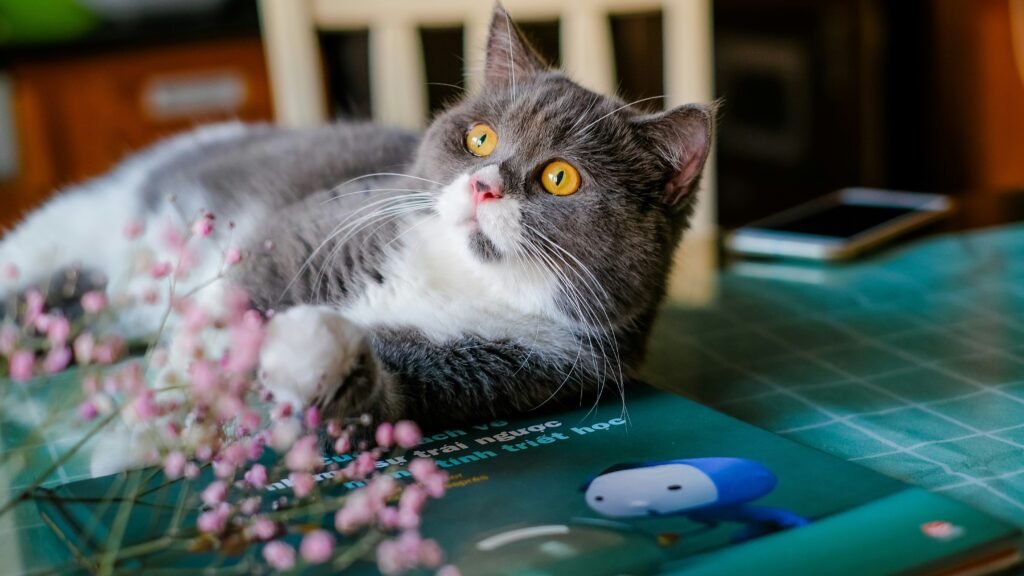
If you’re thinking about getting a short haired cat, here are some things to consider:
- Activity level: Do you want an active, playful cat or a more laid-back lap cat?
- Vocalization: Some short haired breeds, like Siamese, are very vocal. Is that okay in your home?
- Shedding: While short haired cat breeds generally shed less than long haired cats, some shed more than others.
- Allergies: If anyone in your home has cat allergies, you should spend time with a cat of the breed you’re considering before bringing one home.
- Space: Some short haired breeds, like Bengals, need plenty of space and things to climb. Others are fine in smaller homes.
- Other pets: If you have other pets, choose a breed that’s known to get along well with others.
- Grooming time: While short haired cat breeds need less grooming than long haired cats, some still need regular brushing.
- Adoption vs. breeder: Consider adopting a short haired cat from a shelter. Many mixed-breed cats have wonderful short coats too!
Remember, every cat is an individual, so spend time getting to know a cat’s personality before deciding to bring them home.
Health Considerations for Short Haired Cat Breeds
While short haired cats are generally healthy, like all cats, they can be prone to certain health issues. Here are a few things to be aware of:
- Skin problems: Without long fur to protect them, some short haired cats might be more prone to sunburn or skin irritations.
- Overheating/cold sensitivity: Breeds like the Sphynx, with very little fur, can get cold easily and might need sweaters in chilly weather. They can also sunburn easily.
- Dental issues: This isn’t specific to short haired cats, but all cats can develop dental problems. Regular teeth cleaning is important.
- Breed-specific issues: Some breeds are prone to certain health problems. For example, Scottish Folds can sometimes have joint problems related to the gene that causes their folded ears.
- Obesity: This can be an issue for any cat, but some short haired breeds like British Shorthairs are particularly prone to weight gain.
Always consult with a veterinarian for the best advice on keeping your short haired cat healthy.
The Joy of Short Haired Cat Breeds
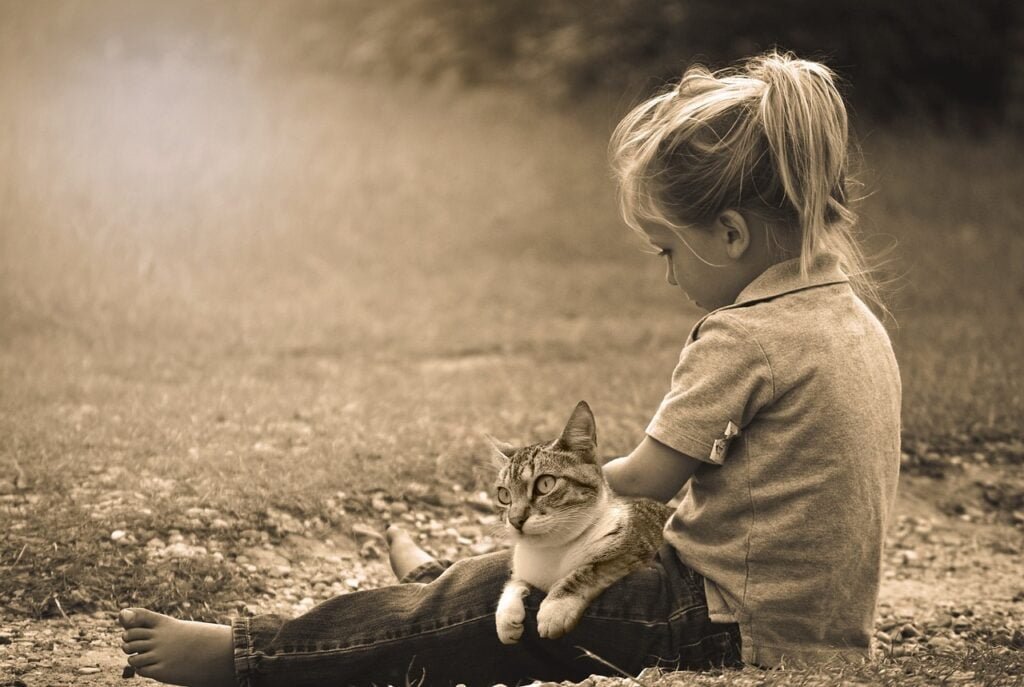
Short haired cats bring so much joy to their humans. Here are just a few reasons why people love these sleek kitties:
- Easy grooming: Less fur means less time spent brushing and fewer hairballs to clean up.
- Cleaner house: Short haired cats often shed less, which means less cat hair on your clothes and furniture.
- Cool in summer: Short haired cats are often more comfortable in hot weather than their long haired cousins.
- Sleek looks: Many people love the elegant, streamlined appearance of short haired cats.
- Easier to check for health issues: With less fur, it’s easier to spot any lumps, bumps, or skin problems on short haired cats.
- Less matting: Short haired cats are less likely to develop painful mats in their fur.
- Diverse personalities: From the chatty Siamese to the laid-back British Shorthair, there’s a short haired cat to suit every personality preference.
- Athletic abilities: Many short haired breeds, like Abyssinians and Bengals, are known for their acrobatic skills and love of play.
- Cuddliness: Don’t let the short fur fool you – many short haired cats are super soft and love to cuddle!
- Unique looks: From the wrinkly Sphynx to the spotted Bengal, short haired cats come in all sorts of interesting appearances.
Conclusion
Short haired cat breeds offer a wonderful mix of beauty, personality, and ease of care. Whether you’re drawn to the chatty Siamese, the plush British Shorthair, the active Bengal, or any other short haired breed, there’s sure to be a kitty out there that’s perfect for you.
While they might not have the flowing locks of their long haired cousins, short haired cats have their special charm. Their sleek coats come in a rainbow of colors and patterns, and their personalities are just as diverse as their looks. From lap cats to acrobats, there’s a short haired cat to suit every lifestyle.
Remember, whether you choose a purebred short haired cat or adopt a mixed-breed kitty from a shelter, the most important thing is finding a cat that fits well with your family and lifestyle. With their easy-care coats and lovable personalities, short haired cats can make wonderful companions for all sorts of people.
So, are you ready to welcome a sleek and sweet short haired cat into your life?
With their charming personalities and low-maintenance coats, these cats are sure to steal your heart (and maybe a little less of your lint roller tape) in no time!

